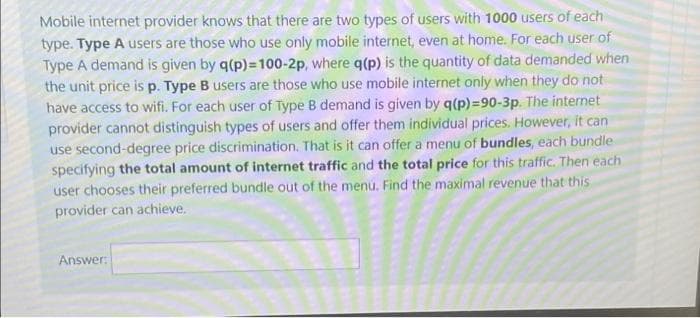Mobile internet provider knows that there are two types of users with 1000 users of each type. Type A users are those who use only mobile internet, even at home. For each user of Type A demand is given by q(p)=100-2p, where q(p) is the quantity of data demanded when the unit price is p. Type B users are those who use mobile internet only when they do not have access to wifi. For each user of Type B demand is given by q(p)=90-3p. The internet provider cannot distinguish types of users and offer them individual prices. However, it can use second-degree price discrimination. That is it can offer a menu of bundles, each bundle specifying the total amount of internet traffic and the total price for this traffic. Then each user chooses their preferred bundle out of the menu. Find the maximal revenue that this provider can achieve.
Mobile internet provider knows that there are two types of users with 1000 users of each type. Type A users are those who use only mobile internet, even at home. For each user of Type A demand is given by q(p)=100-2p, where q(p) is the quantity of data demanded when the unit price is p. Type B users are those who use mobile internet only when they do not have access to wifi. For each user of Type B demand is given by q(p)=90-3p. The internet provider cannot distinguish types of users and offer them individual prices. However, it can use second-degree price discrimination. That is it can offer a menu of bundles, each bundle specifying the total amount of internet traffic and the total price for this traffic. Then each user chooses their preferred bundle out of the menu. Find the maximal revenue that this provider can achieve.
Chapter6: Demand Relationships Among Goods
Section: Chapter Questions
Problem 6.4P
Related questions
Question
5

Transcribed Image Text:Mobile internet provider knows that there are two types of users with 1000 users of each
type. Type A users are those who use only mobile internet, even at home. For each user of
Type A demand is given by q(p)=100-2p, where q(p) is the quantity of data demanded when
the unit price is p. Type B users are those who use mobile internet only when they do not
have access to wifi. For each user of Type B demand is given by q(p)=90-3p. The internet
provider cannot distinguish types of users and offer them individual prices. However, it can
use second-degree price discrimination. That is it can offer a menu of bundles, each bundle
specifying the total amount of internet traffic and the total price for this traffic. Then each
user chooses their preferred bundle out of the menu. Find the maximal revenue that this
provider can achieve.
Answer:
Expert Solution
This question has been solved!
Explore an expertly crafted, step-by-step solution for a thorough understanding of key concepts.
Step by step
Solved in 2 steps with 2 images

Knowledge Booster
Learn more about
Need a deep-dive on the concept behind this application? Look no further. Learn more about this topic, economics and related others by exploring similar questions and additional content below.Recommended textbooks for you


Essentials of Economics (MindTap Course List)
Economics
ISBN:
9781337091992
Author:
N. Gregory Mankiw
Publisher:
Cengage Learning


Essentials of Economics (MindTap Course List)
Economics
ISBN:
9781337091992
Author:
N. Gregory Mankiw
Publisher:
Cengage Learning